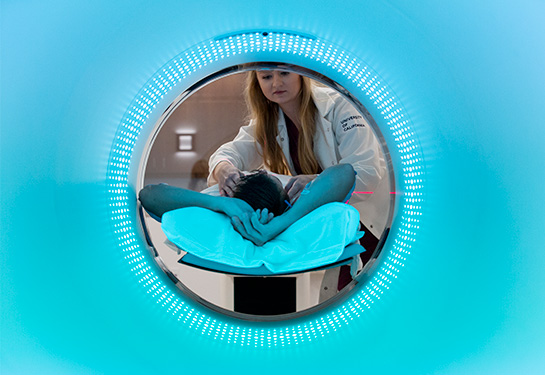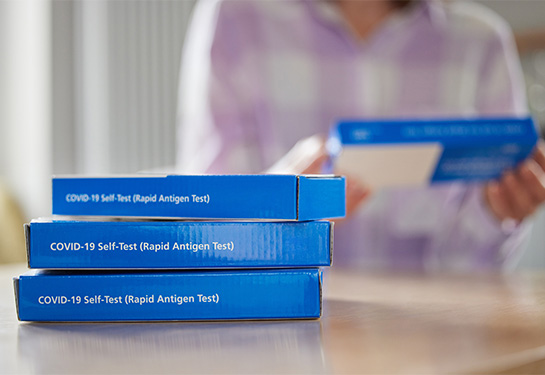Why MIS-C is a life-threatening COVID-19 complication that parents don’t want to miss (video)
High fever, rash, vomiting and diarrhea may be signs of Multisystem Inflammatory Syndrome in Children
Multisystem Inflammatory Syndrome in Children (MIS-C) often strikes when many families least expect it—after a child has recovered from COVID-19 infection. Dean Blumberg, chief of pediatric infectious diseases at UC Davis Children’s Hospital, has treated many cases of MIS-C. He answers some common questions about this life-threatening complication of COVID-19.
What are the symptoms of MIS-C?
MIS-C can affect any organ, including a child’s heart, lungs, kidney, gastrointestinal tract, brain and skin. Many of these organ systems become inflamed two to four weeks after an acute COVID-19 infection. Children recover from the COVID-19 infection, but then get a high fever and variety of different symptoms including rash, abdominal pain, vomiting and diarrhea. Sometimes the child’s eyes can be red and runny.
Does the MIS-C rash have a specific appearance?
We have seen a variety of rashes associated with MIS-C. There isn’t one particular kind of rash that is tied to MIS-C. The rash can be anywhere – on the face, the arms, the legs, or the rest of the body.
How common is MIS-C?
MIS-C occurs in 1 out of every 3,000 children who get COVID-19. In the U.S., there have been more than 6,400 cases of MIS-C and we think there’s a lot of underreporting. More than 50 children have died in the U.S. Fifty-nine percent of the MIS-C cases nationally are in Hispanic/Latino or Black, Non-Hispanic children.
How will I know if my child has MIS-C?
In general, these children are really very sick because they have a high fever and they have all these other significant symptoms. Parents will know to bring their child to the doctor or go to urgent care or the emergency room to be seen. It’s not something subtle that parents would miss.
It’s good for parents to know that MIS-C is out there. When children have acute COVID-19 infection, that’s one problem to worry about. But parents might want to be on the lookout two to four weeks after their child recovers from COVID-19 to make sure their children don’t have any of these symptoms. If they do get a fever, especially if they get a high fever associated with other signs and symptoms, it would be a good idea to contact your health care provider and get your child seen by a doctor.
What treatments are available?
We have treatments that affect the immune system and the inflammatory response. If children don’t respond to our first initial treatment, we have back-up treatment plans and we have other stronger medications to bring down the inflammation so that the symptoms resolve.
Does the COVID-19 vaccine lower my child’s risk of getting MIS-C?
Since the vaccine prevents COVID-19, it also prevents MIS-C. The Centers for Disease Control and Prevention (CDC) just released research this month that showed that two doses of the COVID-19 vaccine had a 91% effectiveness rate against MIS-C.
Who is at highest risk for MIS-C?
MIS-C is most common among unvaccinated children who are 5-13 years of age. But we have seen it in younger children as well as in older children. Young adults can get it, too. In adults, it’s called MIS-A or Multisystem Inflammation Syndrome in Adults.
Are there long-term consequences of MIS-C?
Unfortunately, some children can die from it. Most children do recover. Some children who get inflammation of the heart with MIS-C can sustain lasting damage to their heart function. It’s certainly something we are concerned about.
Is this a condition that existed before COVID-19?
This is something that has not been previously described before COVID-19. It’s similar in some senses to Kawasaki Disease, which some parents may be familiar with because that also causes a high degree of inflammation associated with fever and rash.
Can you get MIS-C more than once?
It is possible to get MIS-C more than once, but it is very rare.
Is it okay for my child to be vaccinated if they have had MIS-C? How soon after MIS-C can they be vaccinated?
The CDC advises that children can receive the COVID-19 vaccine if they have recovered from MIS-C and if 90 days has passed since their MIS-C diagnosis.
Learn more about scheduling a COVID-19 vaccine at UC Davis Health or through the state of California’s vaccine site.
Related stories
Child with MIS-C receives life-saving care at UC Davis Children’s Hospital



